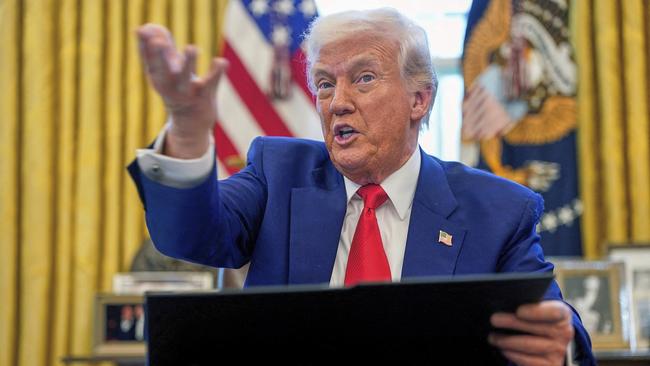Andrew Forrest hits out at Donald Trump’s ‘poor calls’ on tariffs
Fortescue founder Andrew Forrest says the pressure is now on the US President to rejuvenate economies damaged by a global tariff storm that sent sharemarkets on a rollercoaster ride.

Billionaire iron ore mogul Andrew Forrest has slammed “poor calls” made by Donald Trump, adding to a chorus of criticism from business leaders, after the US President announced a 90-day pause on a series of sweeping tariff imposts.
The Fortescue founder said pressure was now on Mr Trump to rejuvenate economies damaged by a global tariff storm that had sent sharemarkets this week on a rollercoaster ride, forcing Washington to pull back punitive measures to appease “yippy” bond and stock moves.
“To be brutal I think Trump has got about two years to demonstrate that he’s had wholesale, massive economic growth … a return which could compensate for the destruction,” Dr Forrest told a forum in Perth on Thursday.
“I don’t think that’s going to happen. I’m a business person, I’m quite serious compared to him and he’s made some very poor calls.”
The ASX 200 rose as much as 6.3 per cent on Thursday in a huge relief bounce after the S&P 500 recorded its biggest one-day gain since the global financial crisis in 2008.
The market meltdown earlier this week had wiped trillions of dollars from sharemarkets, sparking several prominent business figures to criticise the President.
Bill Ackman, the billionaire hedge fund manager behind Pershing Square, called for a 90-day pause in the tariffs to negotiate with other countries, warning that the alternative was “a self-induced, economic nuclear winter”.
Australian companies have also been on edge over the prospect of a long-term trade war, threatening specific industries including pharmaceuticals while also posing a bigger slowdown for major commodity exports to China, the nation’s biggest trading partner. Santos said the recent turbulence in global markets was putting investors on edge.
“The global uncertainty in capital markets is affecting stocks worldwide, not only Santos,” chief executive Kevin Gallagher said.
“Despite this, Santos’s business continues to perform well and generate strong cash flows with low production costs.”
Increased US tariffs on China were likely to disrupt commodity producers, according to fund manager T. Rowe Price.
“Regardless of the tariffs’ specifics, the uncertainty is likely to cause businesses and consumers to pause their purchasing activities beyond the immediate rush purchase. Commodity-based businesses that are sensitive to shifts in global demand and supply may experience disproportionate impacts,” said Wenli Zheng, portfolio manager of the China evolution equity strategy at T. Rowe Price.
Last week Wesfarmers chairman Michael Chaney attacked Mr Trump’s tariffs bombshell over concern it would inflict major damage to the global economy as ructions over the trade war rippled through markets and stoked recession fears.
Mr Chaney, one of Australia’s top business figures and a former Woodside Energy chairman, told The Australian he was shocked at Washington’s sweeping tariff crackdown.
Citi this week ran a set of “downside” commodity price assumptions that results in Australian miners earnings falling about 25-35 per cent across the 2026 financial year, with gearing peaking at 28-30 per cent for BHP, Rio Tinto and Fortescue.
However, ANZ on Thursday said concerns over a global recession had eased following Thursday’s announcement of a 90-day pause on implementation of some tariffs, but the risks remain skewed to the downside.
“The unpredictability of US trade policy is likely to have ongoing impacts on investment and trade, as companies and consumers wait for clarity. Importantly, the escalation of trade tension between the US and China shows no sign of abating. That has led us to downgrade our short-term price targets for energy and metal markets by 10-20 per cent,” ANZ said.
“In a worst-case scenario of a global recession (which is not our base case), there is scope for further weakness. In the case of copper, this could drag prices down from current levels by 28 per cent. For oil, we view $US50 a barrel as a likely support level. We maintain our bullish view on gold, with a short-term target of $US3200 an ounce with an upside risk bias as trade developments unfold.”
KPMG said on Wednesday it had been expecting Australia’s economic growth would be sliced by about 0.3 per cent from the trade wars before the latest developments. The potential for a second round of retaliation from China against the US would mean a “more substantial” negative result for Australian and global growth.
The latest developments further question China’s ability to deliver its short-term growth targets, which are already under pressure and will have further implications for its trading partners, including Australia.






To join the conversation, please log in. Don't have an account? Register
Join the conversation, you are commenting as Logout